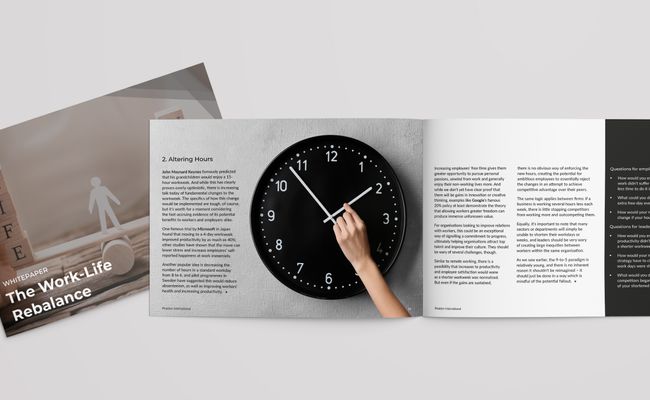A shortened workweek is stipulated to reduce burnout, boost productivity, and improve work-life balance, but does a higher paycheck have more currency?
From the ‘Great Resignation’, a global pandemic, to the popularity of working from home, these seismic events have reframed the future and been a real trigger for the four-day workweek. This new business model, which could see 40-hour weeks slashed down to 32, has gained intercontinental traction recently, dominating headlines and popping up in critical conversations at the boardroom level.
Across the globe, the four-day workweek trials have been raging on. In the UK, 30 companies are currently participating in a six-month trial, and glancing across to the US, a compressed workweek bill is garnering attention in Congress. In Singapore, the shortened work schedule has reached parliament with the early Microsoft Japan study, back in 2019, being used as a successful pilot to showcase an increase in productivity and overall employee satisfaction.
With global franchises from the likes of consumer-goods giant Unilever, to the crowdfunding platform Kickstarter getting behind the concept, the dial is certainly being pushed on what the future of work looks like. Employers are therefore faced with a crucial juncture; fail to comply and get left behind or take a risk and fully embrace the schedule, which might be the perfect hat trick to attract and retain business-critical talent. But does the talent community think this novelty is better bang for their buck?
The results are in
Last month, we surveyed our network of sector professionals to uncover whether they prefer a four-day workweek or higher salary. In our poll of 2,800 global professionals, 52% reported that they’d like their employer to offer a four-day workweek. Aggregating the data to an industry-specific level, despite well over half (57%) of financial services professionals opting for a higher salary, it was a four-day workweek that topped the list for supply chain (52%), life sciences (57%), regulatory and legal (57%), and technology (52%) respondents.
Most interestingly, the higher pay or shorter week conundrum left engineering and infrastructure professionals evenly split down the middle. With these findings and both entities being neck-and-neck, perhaps they shouldn’t be viewed as disparate. One commentator of the poll clarifies, “why value the two options differently unless the four-day workweek is only for 32 hours? If both are equal numbers of hours per week, they should be valued the same.” Both entities are not mutually exclusive – reducing working hours by 20%, for example, doesn’t necessarily equate to productivity plummeting. This also raises an important point about work output versus the traditional 9-5 core working hours. If an employee is more productive in a shorter timeframe, why can’t their salary be primarily based around that instead of the hours clocked in?
Numbers don’t lie
In spite of the LinkedIn poll results being a very close call, it’s safe to say that you can’t put a price on happiness, as shrinking the working schedule evidently carries more resonance to the larger global majority than any monetary rewards. This pendulum shift in motivational factors points to a tantalizing possibility: reducing hours without reducing pay could mitigate the spike in resignations by building an engaging workplace and reigniting that rewarding experience. With the times ever-evolving, let’s take a closer look at the four-day workweek model and hear first-hand from the sentiments in the talent community.
The caveats of a four-day workweek
Although overwhelmingly popular, the four-day workweek does present some significant drawbacks for employers. A key implication is that not every industry can fully participate. In some sectors, such as client/customer-facing businesses, they require employees to be onsite to facilitate to the needs of customers. One respondent of the survey adds, “I would choose a higher salary as a four-day workweek is not doable for many positions. If you are in a support role and have three shifts to cover, it is easier than if you are an analyst or engineer where you may be needed five days a week.”
What’s more, a condensed workweek might have a knock-on effect to the already prevalent inequality gap. How can one quantify if a knowledge worker should be moved to a compressed schedule over a manual worker that is typically paid based on their working hours? Additionally, the cost might outweigh the benefits. For example, if a full-time worker costs more to employ than an annual salary, employers could face a crossroads – by an inability to retain this cohort of talent or hire more people to cover the workload.
The case for a four-day workweek
On the flip side of the coin, working less is unequivocally recognized to have a positive correlation between productivity and happiness. Historian and economist, Rutger Bregman, author of Utopia for Realists, clarifies that a reduced workweek is nothing new, “in the 1920s and 1930s, there were actually major capitalist entrepreneurs who discovered that if you shorten the working week, employees become more productive. Henry Ford, for example, discovered that if he changed the working week from 60 hours to 40 hours, his employees would become more productive, because they were not that tired in their spare time.”
From an employee standpoint, the structure frees up time for personal endeavors, strikes the right work-life balance, and improves mental wellbeing and psychical health. Working fewer hours ultimately contributes to a healthier and happier state of being, as one respondent clarifies, “having time for yourself means that you can focus on long-term goals rather than sticking to one job. Working on yourself always pays off more in the long-term rather than working for someone else.” But the benefits are not solely constrained to employees. For employers, it radically lowers employee burnout, boosts retention, and decreases office expenditures and an organization's carbon footprint.
The bottom line
The future workplace is poised in a state of transformation. With the exponential rise in resignations, the immense popularity in home working, to global momentum towards working less, these huge changes bring with it disruptions as well as opportunities.
It’s no doubt that competition for talent is amplifying. How can enterprises remain ahead of the curve? Internally restructuring business models might be the answer, but this is only one part of the pie. To stay on a front footing, organizations need to have ears and eyes in the labor market and work hard to understand their unique sentiments, pain points, and motivations. As a reputable global talent partner with a well-established legacy, we have extensive knowledge of the end markets we serve to match people to the right job – a particular passion of ours that we’ve been doing since 2004.
Whether you’re a professional actively seeking a new opportunity or you’re a client looking to find industry-leading talent, we have got you covered. Have a confidential discussion with one of our talent specialists today. Contact us.
About Us
Phaidon International is the parent company of six specialist talent brands. Together, the Phaidon International group exists to solve one of the top challenges faced by companies globally – securing business-critical talent. From 12 global office hubs, the Phaidon International group provides bespoke permanent and contract talent services around the world:
·Selby Jennings: Banking and financial services
·DSJ Global: End-to-end supply chain
·EPM Scientific: Life sciences
·LVI Associates: Engineering and infrastructure
·Glocomms: Technology
·Larson Maddox: Regulatory and legal







